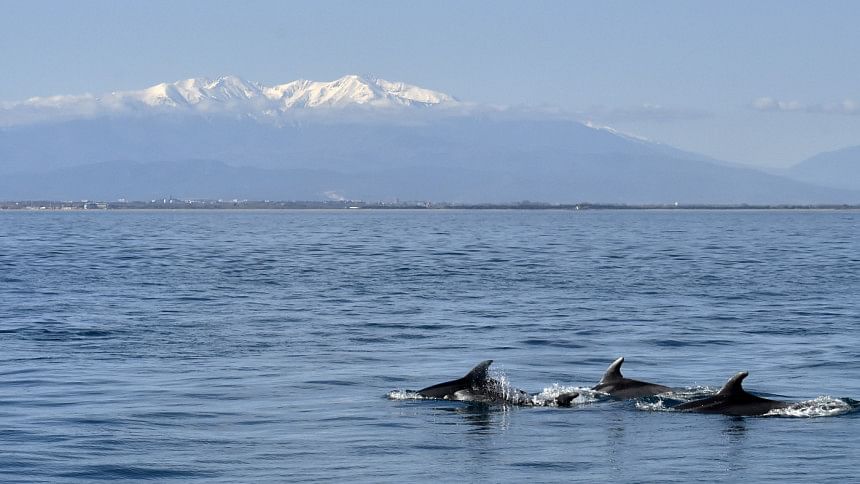We should ratify the high seas treaty

On June 19, all 193 member states of the United Nations came together to unanimously adopt an unprecedented agreement, known as the "high seas treaty" or the Biodiversity Beyond National Jurisdiction (BBNJ) treaty. This landmark treaty follows two decades of intensive negotiations under the United Nations Convention on the Law of the Sea (UNCLOS), a framework that had already paved the way for significant advancements in ocean governance since its inception in 1982. Bangladesh became a signatory to the UNCLOS in 2001, affirming its commitment to international maritime regulations.
The UNCLOS divided the world's oceans into two parts: areas under national jurisdiction and areas beyond national jurisdiction. Remarkably, just 39 percent of the global ocean is governed by individual countries, leaving the rest unregulated. At the same time, UNCLOS' existing framework falls short in addressing conservation and the sustainable use of marine biodiversity beyond national borders. This has led to biodiversity loss and ecosystem degradation due to climate change and human activities like overfishing, pollution, and deep-sea mining.
The high seas treaty presents a promising solution to address these gaps and provide improved protection for our oceans. Its adoption marks a significant stride in safeguarding marine resources by rectifying shortcomings and establishing a stronger system for conserving and managing marine biodiversity beyond national boundaries. But for this treaty to be effective, nations must ratify it.
In a significant step towards safeguarding marine biodiversity and sustainable utilisation of ocean resources, the European Union has pledged its support for the ratification and early implementation of the treaty, once it is ratified by 60 parties. As part of its commitment, the EU has allocated 40 million euros through a Global Ocean Programme to facilitate the ratification process. Additionally, it has urged all countries to contribute within their capacities to ensure the treaty's successful implementation.
Situated in a region with extensive maritime boundaries and diverse marine ecosystems, Bangladesh stands to gain immense benefits from this agreement. By becoming a party to the treaty, the country can play a pivotal role in global efforts to address critical challenges such as overfishing, marine biodiversity loss, and habitat degradation in areas beyond national jurisdictions. The treaty's provisions would provide a framework for cooperation, technology transfer, and capacity building, enabling Bangladesh to better conserve and responsibly utilise high seas resources. By joining the ranks of nations championing the BBNJ treaty, Bangladesh can reinforce its position as a responsible steward of marine ecosystems and demonstrate its determination to secure a sustainable future for its citizens and the broader global community.
Amidst Bangladesh's fervent focus on the blue economy and its various development projects, concerns of potential environmental degradation loom large. Agreeing to the treaty could serve as a vital tool in mitigating these environmental risks. As the treaty emphasises the enhancement of resilience and incorporates provisions grounded in the "polluter pays" principle, it offers a comprehensive framework to address and rectify the negative impacts that may arise from developmental activities through environmental impact assessment. Ratifying the treaty would be a proactive stance that aligns perfectly with Bangladesh's aspirations for sustainable development.
Bangladesh can also gain significant advantages in terms of capacity building and technology transfer. The treaty acknowledges the vital role of these elements in bolstering the capabilities of developing nations, enabling them to actively engage in high seas activities and reap the benefits. Additionally, the focus on benefit-sharing underscores the treaty's commitment to equitable distribution of gains from marine genetic resources, a crucial provision ensuring that developing countries receive their fair share. The treaty's emphasis on scientific research and data sharing is equally noteworthy, as it facilitates the exchange of essential scientific and technical insights related to marine biodiversity and ecosystem dynamics in the high seas.
Developing countries face challenges in preventing marine pollution beyond their borders due to limited resources, but a collaborative approach under the treaty among neighbouring nations will offer a pragmatic solution. By pooling resources and expertise, these countries can enhance monitoring and enforcement capabilities, addressing pollution by shipping and offshore activities. This strategy fosters regional responsibility and enables joint monitoring systems and response protocols, bolstering the ability to tackle pollution in high seas areas. However, during the ratification process, Bangladesh should take specific factors into account. While the treaty offers good things, it also comes with duties and responsibilities. It says we have to be careful when using ocean resources, check how our actions might harm the environment, and share knowledge fairly. To make all this work, we need to have the necessary ability, resources, and coordination. Hence, Bangladesh should proactively work to align the treaty with its own growth ambitions, ensuring a harmonious balance that prioritises environmental well-being.
Bangladesh stands on the brink of a transformative opportunity: the chance to ratify the high seas treaty. This holds immense promise for our nation and the oceanic treasures that surround us. Through the ratification, we can showcase our commitment to global cooperation and environmental stewardship. Bangladesh should seize this moment and stand at the forefront of ocean protection – for our prosperity, our environment, and our shared future.
Jenifar Nesa Popi is a lecturer at the Department of Maritime Law and Policy of Bangabandhu Sheikh Mujibur Rahman Maritime University.

 For all latest news, follow The Daily Star's Google News channel.
For all latest news, follow The Daily Star's Google News channel. 








Comments